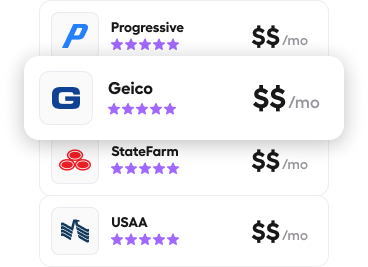Providers we partner with
Why do I need Car/Auto Insurance?
Drive a car, truck, motorcycle? Then you need to be insured – auto insurance is non-negotiable. Besides the fact it’s a legal requirement in all but two US states (we’re looking at you, New Hampshire and Virginia), if you drive a car, you need to have auto insurance. Why? Well, it gives you some financial protection if your car is damaged or stolen — and it does the same if you damage another car.
Key insights from WeCompare
- The auto insurance industry was worth $362.1bn in 2023, according to IBISWorld
- The average cost of full-coverage auto insurance is £2,008 a year, according to MarketWatch
- It’s estimated that there are around 29 million uninsured drivers in the US
- An 18-year-old driver can pay 3x more for auto insurance than a 30-year-old driver

Why you can trust WeCompare
Getting a quote for car insurance used to be a frustrating task, but not with WeCompare! We officially partner with America’s leading Car Insurance providers, like Geico, Progressive and State Farm, to make getting a quote quick and easy. It’s how car insurance should be.
52 years
of industry expertise
39.7k
ZIP codes examined
60 secs
to get a quote
How does Auto Insurance work?
In basic terms, auto insurance works like this – you find an insurance company, provide details of your vehicle, and a few personal details (not that personal, don’t worry), choose the level of cover, and pay for that cover. You can usually choose to pay in full, or opt for a monthly payment plan – that’s something for you to discuss with your insurer.
All being well, you won’t need to make a claim on your auto insurance, so it’s just a case of having that cover in place, like a safety net, if you do ever need financial assistance. You’ll need to renew your auto insurance every year, but that doesn’t need to be with the same insurer. You can switch, if you find cheaper auto insurance and a policy that ticks all your boxes – which is where We Compare can help.
Auto insurance cover levels
Auto insurance isn’t a one-size-fits-all deal. You’ll find different types of auto insurance and different levels of auto insurance, so don’t assume your vehicle will be covered for everything. Don’t blame us, we don’t make the rules. We’re just here to help you get a better deal on your auto insurance.
Make sure you check what is and isn’t included before taking out an auto insurance policy – you don’t want to get caught out later, when you need financial support.
Whatever auto insurance cover you have, there are minimum levels of cover required – and these are set by state. So, if you live and drive in California, you might need a different minimum level of auto insurance cover than if you live in Alaska (just like you need a different set of clothes in your wardrobe, too).
Typically, all US states require drivers to have:
- Bodily Injury Liability – this covers any medical expenses that someone else needs after being injured in an accident you cause
- Property Damage Liability – this covers the cost of any damage to someone else’s car that you cause. It also covers damage to other objects — if you drive into someone’s home, for example
State Law in some parts of the US might also require your auto insurance to include:
- Uninsured and Underinsured motorist coverage (UM/UIM) – Uninsured cover applies if you’re in an accident with a driver who isn’t insured. Underinsured cover pays out if an at-fault driver causes an accident and doesn’t have a high enough level of insurance to fully cover your costs.
- Medical Payments or Personal Injury Protection – if you or any passengers are injured in an accident, this covers any medical treatment and expenses that are required as a result. This also covers funeral expenses.
Collision and Comprehensive cover:
Neither Collision or Comprehensive cover are usually required by State Law, but if you’ve bought a car on finance or used a loan to help pay for it, your lender might expect you to have both of these in place. It helps to protect their financial interest in your vehicle — but also gives you the peace of mind of knowing that your car is covered for most eventualities.
- Collision – cover that repairs or replaces your vehicle if it’s been damaged because of an accident. This could be with another vehicle, or if you drive it into a tree. Or into a building.
- Comprehensive – cover that repairs or replaces your vehicle if it’s been damaged by vandalism, fire or has been stolen. It also provides cover from damage through extreme weather – storms and floods.

You can save money through discounts by shopping in advance, paying your bill in full, and considering a telematics program that measures your driving
Kate Terry
CEO & Co-Founder, Surround Insurance
What affects auto insurance prices?

Your Location
Where you live makes a difference to how much you pay for your auto insurance. States like Maine and Idaho tend to have cheaper rates than Louisiana, Florida and Delaware – but it’s based on a whole load of factors, including road congestion and weather conditions. If you live in a built-up urban area, you’re probably going to pay more than someone who lives in a quieter rural spot.

Your Driving Record
Bad news if you have a poor driving record – insurers are going to take notice. If you’ve got a history of bumps, prangs and collisions, and made claims on your auto insurance, you’ll pay more than a motorist with a clean driving record. If you’ve chalked up any traffic violations too, you’ll be considered a higher risk driver.

Your Vehicle Type
What you drive has a big impact on the cost of your auto insurance. High-performance cars are generally the most expensive – drive a Porsche Taycan or a BMW M8 and you’ll pay thousands more a year than if you’re behind the wheel of a humble Honda HR-V or Chevrolet TrailBlazer.
The age of your vehicle is a factor, too. New and newer models are more expensive to replace, compared to older, used cars.

Your Age & Gender
It’s well known that young and inexperienced drivers face higher premiums – they’re statistically more likely to be involved in an accident (especially males). Prices tend to level out until around the age of 65-70 onwards. A win for the middle aged, at last!

Your Credit Score
Insurers will check your credit score when calculating the price of your premium. If you have a good credit score, the better your chances of a lower premium; insurers will use your score to predict the probability of you making a claim.

Other Factors
Insurers will also look at lots of other factors in the complicated matrix of stuff they use to work out how much to charge you. These include marital status (singletons are seen as higher risk), your insurance history, vehicle use – how often you drive, annual mileage – and where the vehicle is parked overnight. Parked in a secure garage provides a lower risk than parking it on the road, typically.

The Best Auto Insurance for 2024
WeCompare partners with the biggest and most trusted names in auto insurance to bring you the best prices – as quickly and easily as possible!
The rates above are based on a single driver with a Toyota Camry or a Toyota Rav 4, no accidents, and good credit. Answer a few questions and get a personalized set of rates that are ready to buy if you are.
How much does auto insurance cost by age? (and why age affects the price)
Age is a major player in the world of auto insurance. Young and newly qualified drivers have relatively little experience of being on the road, so they’re statistically more likely to be involved in an accident — and therefore seen as a higher risk; teenagers are the highest risk age group of all. Sorry, kids. Older drivers are more experienced, having been on the road for years, if not decades, so are viewed as lower risk, and safer, motorists. Auto insurance prices tend to be lower between the ages of 30-60.
From around the age of 65 and older, prices generally rise again – though not as high as for teenagers and under 25. This is because senior drivers may see their motoring skills gradually declining, with slower responses.
| Age | Annual full coverage premium | Annual min coverage premium |
|---|---|---|
| 16-year-old | $10,789.40 | $5,874.00 |
| 18-year-old | $12,716.52 | $4,789.44 |
| 21-year-old | $7,921.08 | $2,918.08 |
| 25-year-old | $5,039.97 | $1,771.20 |
| 30-year-old | $4,089.54 | $1,466.70 |
| 35-year-old | $4,251.63 | $1,414.53 |
| 40-year-old | $4,056.72 | $1,368.99 |
| 45-year-old | $3,927.93 | $1,342.35 |
| 50-year-old | $3,662.67 | $1,276.71 |
How to get a quote
Getting a quote for auto insurance was once a backbreaking task. Not with WeCompare. Our sophisticated and fancy online calculator does all the work for you – just key in a few details, tap ‘find the best plan for me’ and we’ll, er, find the best plan for you. Quick, and easy.

Auto insurance can be expensive in the 12 States where no-fault insurance is required, meaning drivers need to have personal injury protection to cover their medical bills after an accident
Chong Gao
Director of Product Management R&D, Mercury Insurance
Does my homeowner status affect the cost of auto insurance?
Some insurers might consider homeowners to be more stable drivers, and potentially factor this into the cost of your auto insurance premium – especially compared to someone who has rented in different properties over a few years. Being a homeowner won’t have a significant impact, though it can help improve your credit score – which is a factor. And, if your home insurance and auto insurance policies are with the same provider, you may be rewarded with a discount.
Can my auto insurance premiums be influenced by my credit score?
Yep. With just about everything in terms of finance, a good credit score is always going to be looked upon more favorably than a bad credit score. If your credit score is poor, there’s a chance it can influence your auto insurance price; someone with bad credit is often considered more likely to make a claim on their auto insurance.
A poor credit score might also restrict the auto insurance deals made available to you, especially if you choose to pay monthly.
| Credit Score | Average monthly cost* | Average annual cost* |
|---|---|---|
| Poor < 580 | $352 | $4,512 |
| Fair 580 – 669 | $256 | $3,084 |
| Good 670 – 739 | $203 | $2,465 |
| V. good 740 – 799 | $158 | $1,808 |
| Excellent 800+ | $110 | $1,234 |
How much will my driving record affect the cost of auto insurance?
Insurers want to know your driving history when they offer you auto insurance, so the answer is – a lot. Your driving record has a big impact; someone with a clean driving record will always have a better shot at a lower premium than someone with violations on their record.
Driving offenses are treated differently by insurers. Some are ranked by severity. A speeding offense may only affect your premium slightly – especially if it was years ago – but conviction for Driving Under the Influence (DUI) is highly likely to see a big increase against the average auto insurance price.
| Credit Score | Avg. monthly cost* | Avg. annual cost* | Increase above national avg. |
|---|---|---|---|
| Clean driving record | $192 | $2,299 | 0% |
| Speeding ticket | $231 | $2,773 | 21% |
| At-fault accident | $273 | $3,280 | 43% |
| DUI conviction | $367 | $4,399 | 91% |
Does my marital status affect the cost of auto insurance?
Married? Well, though it might sound strange – and unfair to a driver who’s single – your marital status has a bearing on the price of your auto insurance. In the eyes of insurers, married couples tend to drive more sensibly – especially if they have children in the car – and they may share the same car, and divide the driving duties. Having more than one named driver on an auto insurance policy is a good way of reducing the price.
On the flip side, married couples need to share the TV remote.
How to lower your costs on Auto Insurance
The price of auto insurance in the US has soared in recent years. At its highest level in 50 years, the average cost jumped by 22% between April 2023 and April 2024, up to $839.
But, with auto insurance policies up for renewal annually, you get a once-a-year opportunity to find a cheaper, more affordable auto insurance deal. Here are some tips to bring the price of your premium down.

Use WeCompare to find the best deal
Yep – we’ve put ourselves top of the list, because we’re the most important. Seriously, using a comparison site to search for the best auto insurance deal is the most powerful tool you have. We can search leading insurers in seconds, and serve the best quotes to you in a flash – saving you lots of research time and, hopefully, a decent chunk of cash, too.

Choose a higher deductible amount
What’s the deductible? This is the part of any claim you pay yourself, and it’s applicable with Comprehensive and Collision coverage. You can set this in many cases – the lower it is, the more your insurance company will pay. However, this means that your premium will be higher. Choose to pay a higher deductible, and you’ll contribute more to the cost of repairs – because you’re responsible for a larger share of any payment needed, your premium is usually adjusted lower. If you don’t make a claim, you won’t pay deductible.

Reduce your annual mileage
The more distance you drive every year, the higher your auto insurance is likely to be – you’re using your vehicle more, so it stands to reason there’s an increased chance of an accident occurring. You’ll be asked to estimate your annual mileage when you get a quote. Make sure it’s accurate, but if your circumstances have changed – say you’ve switched jobs and can walk to work now – declare that. If you expect to drive 5,000 miles fewer over the next year, that can reduce your premium.

Bundle your insurance policies
Many insurance companies reward customers for loyalty; if you have home insurance with an insurer, they may offer a good discount for also having your auto insurance with them.

Change your car
Time to change your car? Choose your next model sensibly. Powerful cars with big engines, capable of fast acceleration, will result in much higher auto insurance premiums than more modest models. Hey, it’s why we drive a Mazda instead of a Maserati…

Pay for your policy in full
If you can afford to, pay for your auto insurance policy for the year in full. Some insurance companies will offer a discount for customers who pay for their annual policy right away. Monthly payments might be more convenient, but it’s a form of credit still, and you may be charged a bit extra because of that.

HOW WECOMPARE WORKS
Free reviews, advice and money saving tips tailored to our users.
FAQS
What do I need to get a quote for auto insurance?
It’s fast and simple to get a quote for cheaper auto insurance with WeCompare. All you need to provide is:
- Your zip code, so we know which US state you in
- Date of birth
- How long you’ve had your driver’s license
- Any claims you’ve made in the last five years
- Any traffic violations in the last five years
We’ll also ask if you’re married (that’s all we need to know, not how you met, or first date, we don’t like to pry), your homeowner status and your credit score.
Then, we’ll get to work on finding you the best insurance quote available.
Can I drive without auto insurance?
No, you can’t drive without auto insurance. Well, you physically can, but the consequences are serious and severe – it’s illegal to do so in the vast majority of the USA. Penalties can range from a hefty fine (as high as $5,000), suspension of your driver’s license, and having your vehicle impounded. There’s even a risk of jail time.
Think about it – driving without auto insurance really isn’t a gamble worth taking. Just take the insurance out.
What’s the difference between minimum and full coverage?
Minimum coverage is the level of auto insurance you’re required, by law, to have. It can vary by state, but always includes Bodily Injury Liability and Property Damage Liability.
Both of these can help to pay for damage or injuries you cause, to another person’s car or property, or to the person themselves.
Minimum coverage won’t cover any damage to your own car. Full coverage, which includes Collision and Comprehensive, provides protection for your car if it’s damaged in an accident, stolen, or vandalized.
Can I upgrade my auto insurance policy with any extras?
Yes. Many auto insurance companies offer additional levels of cover if you want to feel a little bit special. There’s an extra cost though, of course. Some of these options include roadside assistance and rental car reimbursement – if you need to rent a car as a replacement vehicle while your regular ride is in for repairs, your insurance will cover the cost.
Talk to your insurance company about any additional cover options they might have available.
Should I always choose the cheapest auto insurance?
We’re on a mission to find you cheaper car or auto insurance deals – but the cheapest option might not be the best option for you. Make sure any auto insurance policy provides the right level of cover you need, otherwise there’s a chance it won’t pay out what you need, when you need it. Think about it as affordable auto insurance, instead of cheap.
What is gap insurance for cars?
Gap insurance is an optional form of cover that many insurers will offer. The Gap part stands for Guaranteed Asset Protection, and it’s a type of insurance that covers the gap between the car’s value, and the amount of finance you might still owe on it.
So, you may have bought a car two years previously on finance, and now it’s been in an accident and been damaged so extensively it’s been totaled. Because of the vehicle’s depreciation in value, it’s worth $15,000 – but, with interest on your finance payments factored in, you still owe your lender $17,500. With Gap insurance, your insurer covers the difference.
Sources:
- https://www.usnews.com/insurance/auto/cheapest-states-for-car-insurance
- https://www.nerdwallet.com/a/insurance/car-insurance
- https://content.naic.org/consumer/auto-insurance.htm
- https://www.forbes.com/advisor/car-insurance/most-least-expensive-cars-to-insure/
- https://www.experian.com/blogs/ask-experian/how-much-does-credit-score-affect-auto-insurance-rates/











